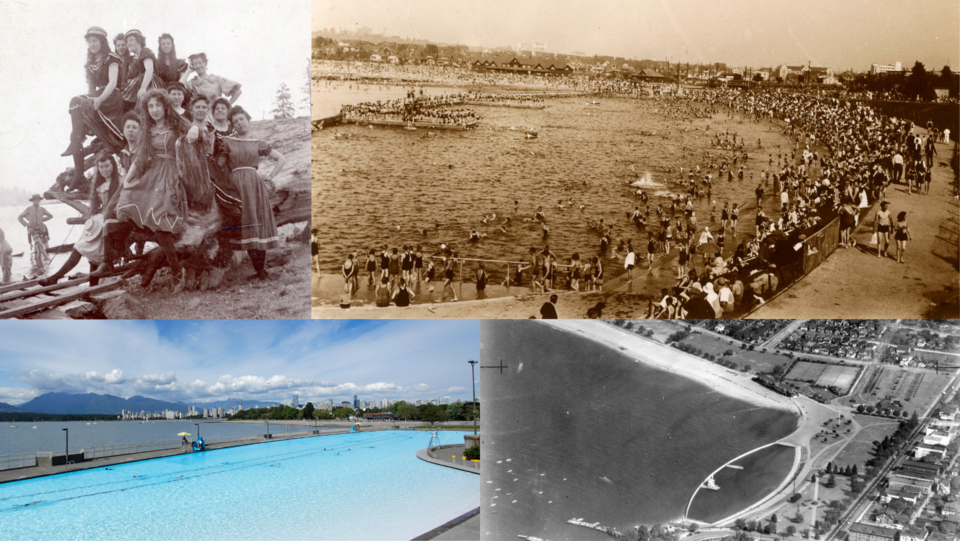Kitsilano Pool and the adjacent beach are one of Vancouver's iconic locations, but that doesn't mean everyone knows much about them.
The beach is regularly rated one of the best in Canada and sometimes the world, though locals still often debate if it's the best in or near the city. Meanwhile, the pool , at least according to Red Bull (when did we let them decide that?).
Its popularity, though, is undoubted. 麻豆传媒映画archives have photos of people hanging out at the beach from the 1890s as it was already drawing crowds then.
1. It used to be called...
Before Kitsilano Beach carried a name derived from a local Squamish chief it had a couple of different names. Most recently it was called Greer's Beach, , who get into a spot of trouble over the land. A homesteader who had worked the land for years, Greer thought he owned the land, and the Canadian Pacific Railway considered him a squatter.
Without getting into all the details and court cases and chasing officials with an ax, we'll fast forward to the end when he wounded a deputy sheriff with a round of buckshot before being arrested and imprisoned.
The beach was still known as Greer's Beach for a time though, but over a few years the name Kitsilano became more common for the area and the beach.
But before all that, it had another name: X瘫epx瘫pa虂y虛em.
That's , which translates to 'having red cedar.' Nearby was the village of .
2. It's salty
When it was first opened it was filled with seawater with the tide, which led to a few sea creatures making it into the pool.
Nowadays it's still filled with saltwater, but the process is a little different.
"The pool is filled at the beginning of each season with seawater from English Bay and then filtered, treated and heated. As the season progresses, the saltwater is replenished with freshwater," the City says in an email to 麻豆传媒映画.
3. It holds a size record in Canada, but used to be bigger
There are lots of records people claim Kitsilano Pool, but the one the city is claiming is the longest saltwater swimming pool in North America.
At 137 metres it's a very long pool, no matter how you slice it. Many pools are 25 m, with Olympic-sized pools exactly 50 m. This is well over double that, and longer than most fields of play.
In fact, if you hit a baseball at Nat Bailey Stadium 137 m it would (probably, depending on the angle) clear the center field fence with plenty of extra distance. It'd even (likely) make it out of the park at Rogers Centre (aka the Skydome) or T-Mobile Park (aka Safeco Field).
But when it was opened in 1931 thousands of people showed up to see an even running 200 m long and 60 m wide at its widest. It was billed as America's largest swimming pool and seawater was let in to fill it (with creatures sometimes getting in as well).
4. It was used as a military training site
In the 1940s more than a few men went full commando on Kitsilano Beach. It was a training ground for soldiers to practice attacking a beach from the ocean, with the army charging off of transport ships and up the beach.
There are photos of the pseudo-assault, which covered a section of the beach with smoke for a time.
5.
The doesn't make her way through the water, but instead appears to paddle through the air.
It's a unique mixture of art and engineering which sits atop a perch over the pool. When the winds come in, the figure, powered by the breeze via a propeller, begins to swim through the air. If winds get too high, there's a mechanism to help protect it.
It was installed in 1996, but was removed for a few years recently to repair the mechanism after a windstorm managed to cause some damage. However, in 2018 she returned to her watch.
Since there's a chance you knew one of those, how about this: a sea monster was once found on Kitsilano Beach.
Ok, this is more an urban legend than a verified sea monster, but it is 100 per cent true that the body of some sort of animal was found in 1941 on the beach and named Sarah the Sea Hag. One expert at the time suggested it was the remains of a 12-foot-long shark.
On that note, there are sharks off Kitsilano Beach sometimes.
With files from Allie Turner and Jessica Kerr



